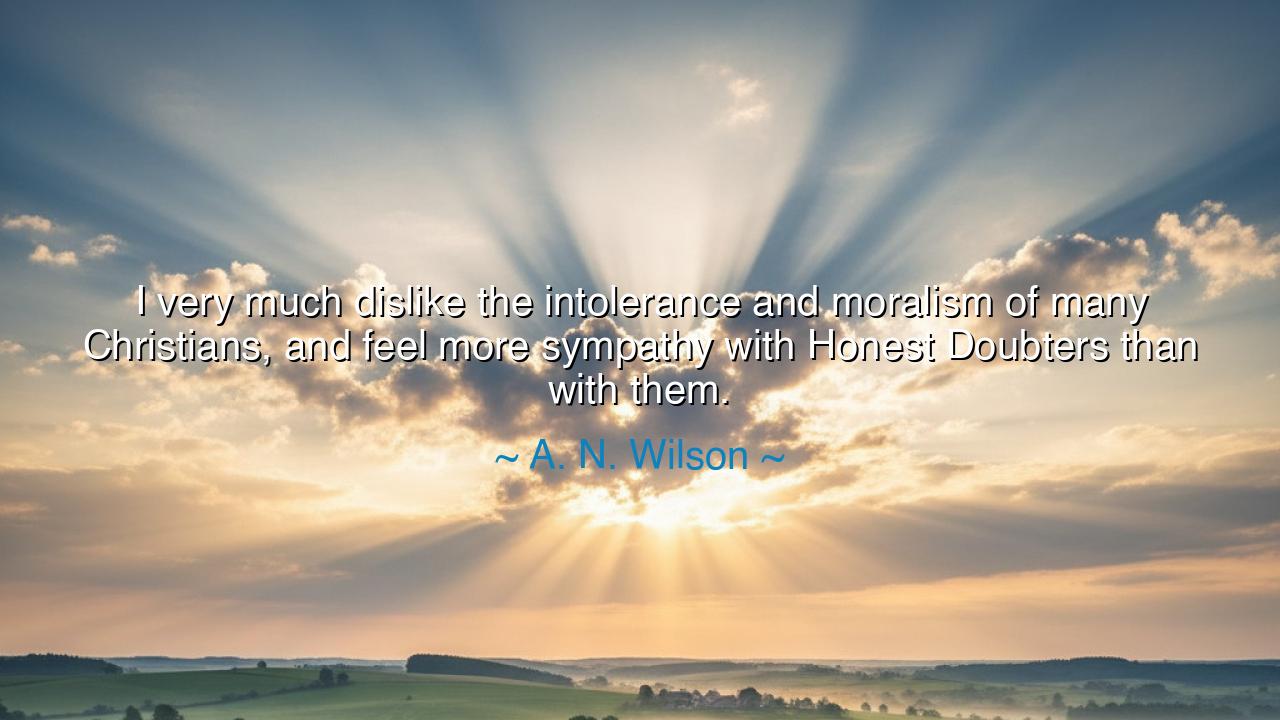
I very much dislike the intolerance and moralism of many
I very much dislike the intolerance and moralism of many Christians, and feel more sympathy with Honest Doubters than with them.






Hear the fierce yet tender words of A. N. Wilson, who declared: “I very much dislike the intolerance and moralism of many Christians, and feel more sympathy with Honest Doubters than with them.” In this cry lies a truth that has echoed through the ages: that faith without compassion becomes a sword, and belief without humility becomes chains. For religion, when hardened into arrogance, ceases to heal and begins to wound. Wilson’s voice, though modern, is joined with the ancient prophets, who warned against those who honor the letter of the law but neglect its spirit.
The heart of this saying lies in the contrast between the rigid and the searching. The intolerant and moralistic often brand themselves as guardians of truth, yet their zeal blinds them to the very love their faith commands. They draw circles of exclusion, condemning those who falter, those who question, those who differ. By contrast, the Honest Doubter, though uncertain, walks in humility. Such a soul does not claim mastery of truth, but seeks it earnestly, aware of their own limits. To Wilson, and to many who have walked the path of reflection, it is better to stand with the doubter who hungers for light than with the believer who uses light as a weapon.
Consider the story of Galileo Galilei, who looked through his telescope and saw worlds unimagined—moons circling Jupiter, stars beyond counting. Yet his vision clashed with the moralism of his age, where certain voices within the Church condemned him not for dishonesty, but for daring to question. Who was closer to truth? The guardians of doctrine who silenced him, or the doubter who sought honestly to understand the heavens? History has answered: sympathy belongs with the doubter, who questioned not out of malice, but from love of truth.
The ancients themselves taught this lesson. The Greek philosophers spoke of the examined life as the highest calling. Socrates, accused of corrupting the youth with doubt, chose death rather than betray the honesty of his questions. He stood not with the moralists of Athens, who claimed certainty and demanded obedience, but with those who searched, who wrestled, who admitted their ignorance. In this, Wilson’s sympathy for the Honest Doubters is revealed as part of a lineage stretching back across centuries.
Yet his words also serve as warning. For faith, whether Christian or otherwise, is not condemned in itself—only when it grows arrogant. The true danger is when belief turns into intolerance, when the moral law is wielded not to guide, but to crush. Religion, which should be a source of mercy and hope, can become instead a scaffold for pride and cruelty. And so Wilson raises his voice against the distortion of the sacred, reminding us that to doubt with honesty may be closer to holiness than to believe with cruelty.
The lesson for us is this: guard your heart against self-righteousness. Whether you believe deeply, or question continually, walk with humility. Extend your sympathy to those who doubt, for doubt is often the seedbed of wisdom. Better to admit, “I do not know, but I seek,” than to thunder, “I know, and you are damned.” Let your convictions be clothed always in compassion, lest they turn into instruments of harm.
Therefore, beloved seekers, embrace this teaching: honor the Honest Doubter, for in their struggle lies sincerity. Challenge intolerance, wherever it appears, even when it hides in the garments of faith. And when you speak of what you believe, let your words be as balm, not as sword. For the Eternal cares less for the pride of certainty than for the tenderness of a heart that loves truth. And as Wilson reminds us, in the end it is sympathy, not moralism, that binds us closer to one another and to the divine.






AAdministratorAdministrator
Welcome, honored guests. Please leave a comment, we will respond soon